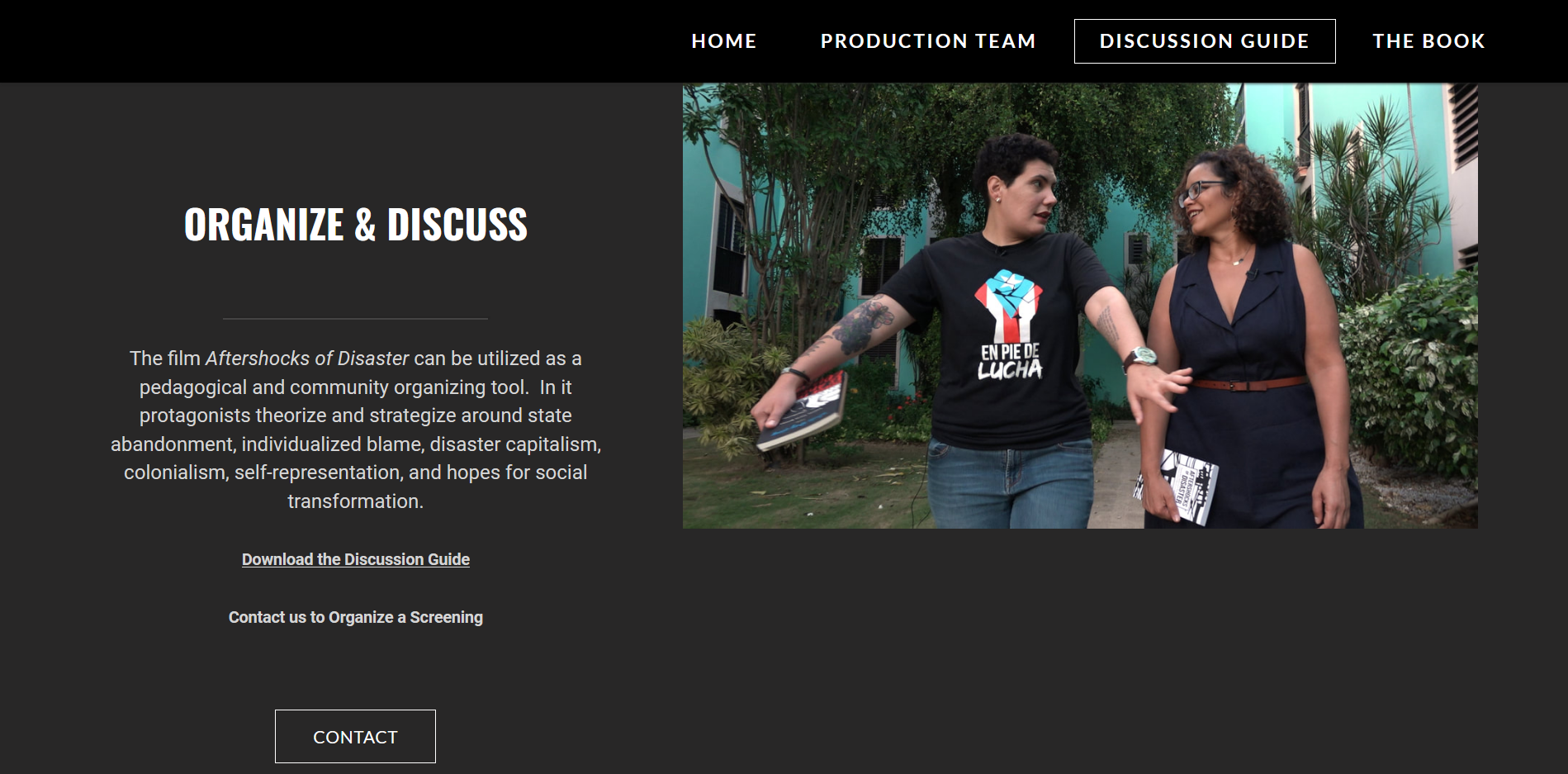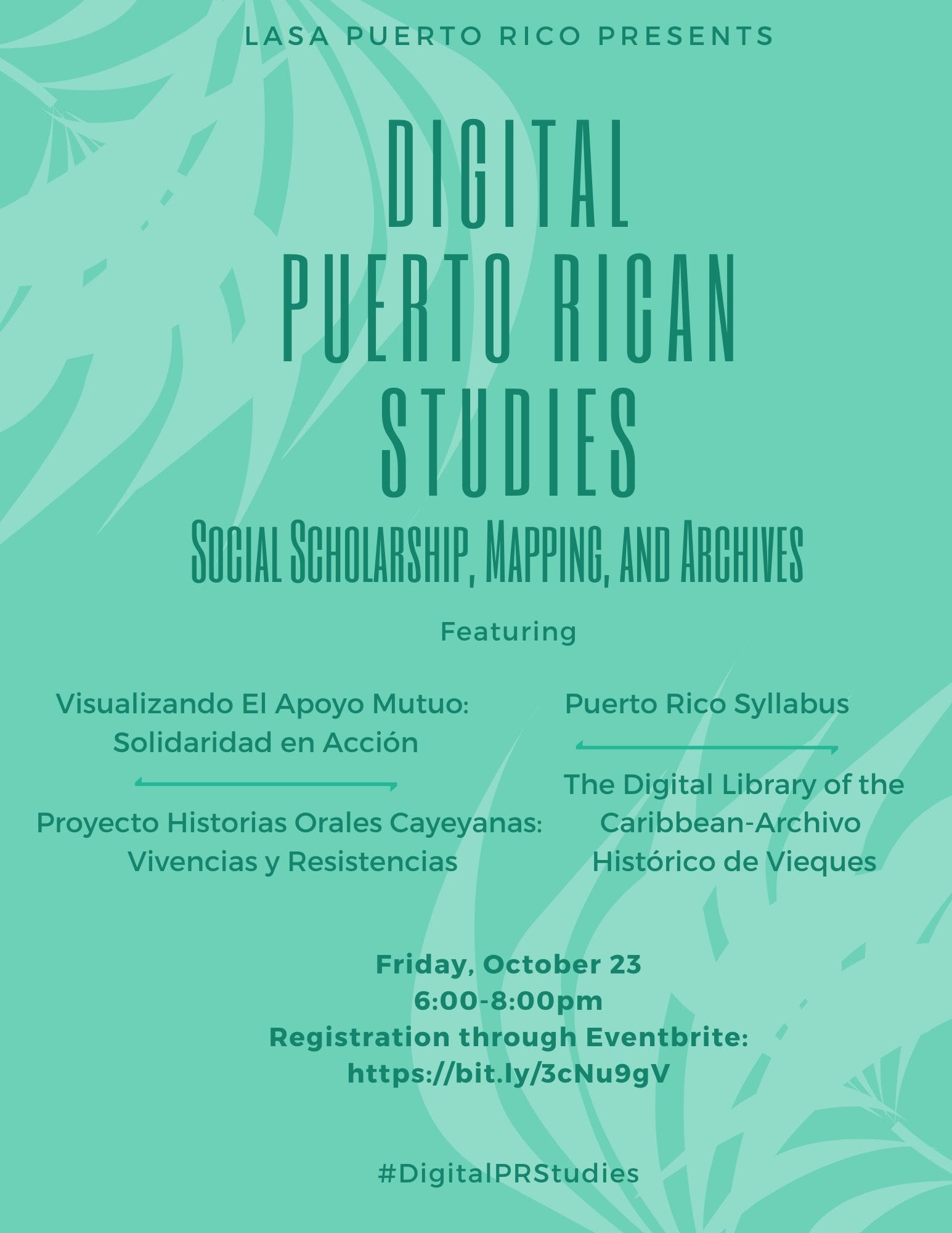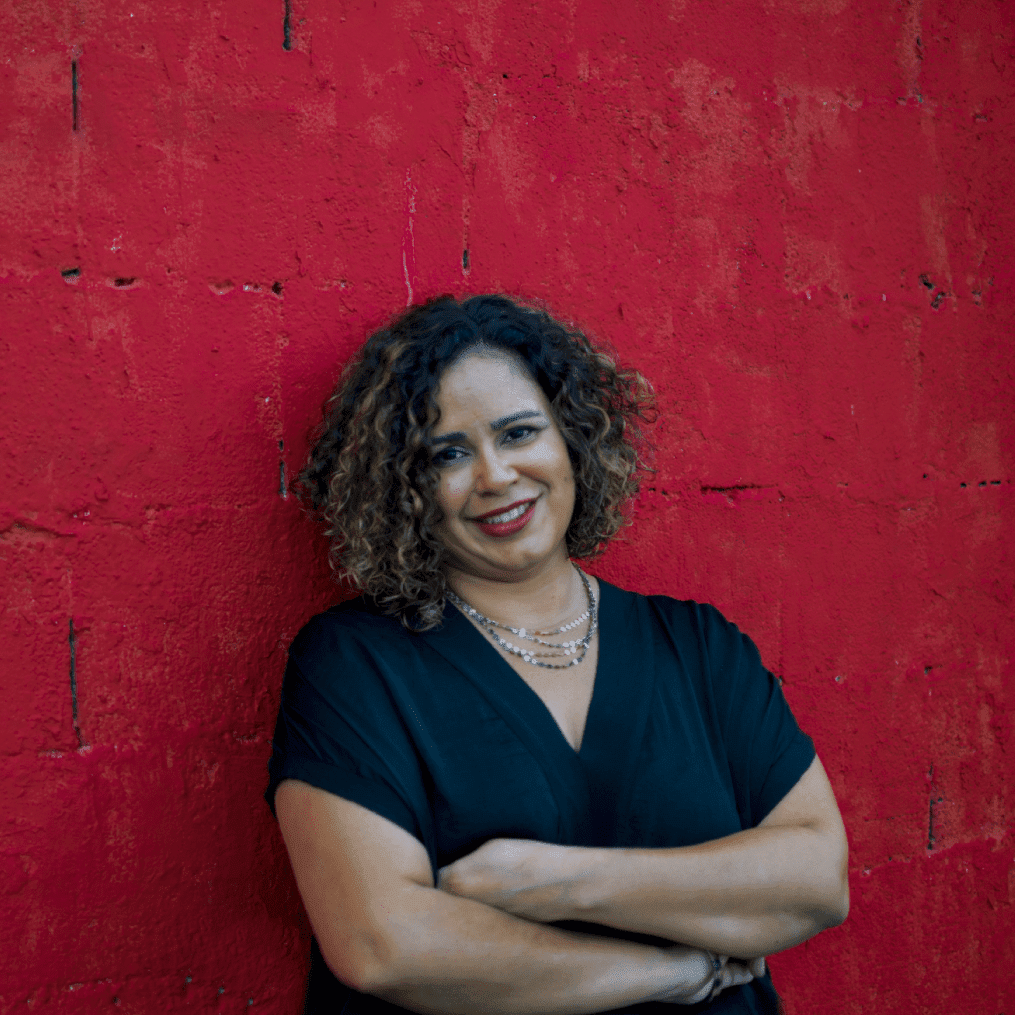During the fellowship period, Seminar Faculty Leader Yarimar Bonilla will build and extend The Puerto Rico Syllabus (puertoricosyllabus.com), a digital resource for critical thinking and teaching about the Puerto Rican Debt Crisis. Through the organization of study groups, teach outs, performances, and other public events, The #PRSyllabus will promote and strengthen forms of public engagement around this digital project. At the same time, Bonilla will work to create dialog among other hashtag/public syllabi initiatives in order to produce a digital white paper on best practices and forms of evaluation for these kinds of efforts.
Goals of the PR Syllabus
- To contribute to the ongoing public dialogue and rising social activism regarding the debt crisis by providing historical and sociological tools to assess its roots and repercussions.
- To understand how the contemporary Puerto Rican debt crisis has its roots in the colonial and capitalist relationship between Puerto Rico and the United States
- To show how the debt crisis is affecting the lives of millions of Puerto Ricans in the territory and the diaspora.
- To provide examples of Puerto Rican groups organizing against the austerity measures being imposed upon them by Washington and Wall Street.
How to Use the Syllabus
The materials gathered help place the current moment within the larger political, social, and economic history of this U.S. territory and illuminate how both the crisis and its proposed solutions are impacting the daily lives of millions of Puerto Ricans both within the territory and across its growing diaspora.
Each topic has a few key texts along with some primary documents, multimedia, and suggestions for further reading. We’ve included texts in both English and Spanish to make this syllabus as accessible as possible, and are working towards a fully bilingual version.
We realize that the topic of debt is intimidating for many, so we’ve sought to provide a carefully curated portal with various points of entry, along with a longer extended bibliography that continues to grow with your suggestions. We hope these materials can help make sense of a context which is yet to be fully historicized and analyzed. As events continue to unfold, we expect this syllabus to evolve; we welcome suggestions via our contact form or using the hashtag #PRSyllabus on Facebook, Twitter, and other social media sites.
Explore the PR Syllabus
- Historical Context
- Explosion of the Debt Crisis
- The Question of Sovereignty
- Infrastructure & Everyday Crisis
- The New Great Migration
- Resistance and New Imaginaries
- Hurricane Maria
- Verano Boricua / #RickyRenunica
Aftershocks of Disaster film
Dr. Yarimar Bonilla, co-editor of the book Aftershocks of Disaster: Puerto Rico Before and After the Storm (Haymarket, 2019) travels through Puerto Rico to interview journalists, poets, photographers, visual artists, and cocommunity activists in this documentary film Aftershocks of Disaster. Aftershocks of Disaster explores the ongoing "aftershocks" experienced by Puerto Ricans in the wake of Hurricane María, including state failure, social abandonment and disaster capitalism.
The film, which emerged from the book by Dr. Yarimar Bonilla and directed with Juan Carlos Dávila, has a new website which includes resources, teaching materials, and a discussion guide on how to use the film as a pedagogical and community organizing tool.
The documentary film features interviews with journalists, poets, photographers, visual artists, and community activists Patricia Noboa, Benjamín Torres Gotay, Sofía Gallisá Muriente, Erika Rodríguez, Adrián Román, Raquel Salas Rivera, Giovanni Roberto and Yarimar Bonilla who explores both the unfolding crisis in Puerto Rico as well as the emergence of new political imaginaries. In it, these protagonists theorize and strategize around state abandonment, individualized blame, disaster capitalism, colonialism, self-representation, and hopes for social transformation.

Visit the Aftershocks of Disaster website to watch and learn more about the film, download the Discussion Guide, and learn about the book Aftershocks of Disaster: Puerto Rico Before and After the Storm, edited by Yarimar Bonilla and Marisol LeBrón, from which the film emerged.
People
Events, Articles, Research & Scholarship:
Digital Puerto Rican Studies: Social Scholarship, Mapping, and Archives
Fri, Oct 23rd, 6:00 PM (EDT) | This event will take place on Zoom. Register here to access the link to Zoom.

This event spotlights four digital projects that contribute to Puerto Rican Studies and provide resources for broad publics: The Puerto Rico Syllabus, Proyecto historias orales cayeyanas: Vivencias y resistencias, Visualizando El Apoyo Mutuo: Solidaridad en acción, and the Digital Library of the Caribbean-Archivo Histórico de Vieques.
The event will include moderated discussion about each project, followed by a Q&A with the audience.
This event is sponsored by LASA Puerto Rico, with media co-sponsorship by the Puerto Rico Syllabus project led by Dr. Yarimar Bonilla as part of the Mellon Seminar on Public Engagement and Collaborative Research from the Center for the Humanities at The Graduate Center, CUNY.
Add to the conversation by using #DigitalPRStudies
About the participating projects:
- The Puerto Rico Syllabus is an archive of resources for teaching and learning about the intersecting crises in Puerto Rico.
- The Proyecto historias orales cayeyanas: Vivencias y resistencias is a virtual interactive exhibit created by the Colectivo Casco Urbano de Cayey that maps oral histories with women about the urban hub of Cayey, Puerto Rico.
- Visualizando El Apoyo Mutuo: Solidaridad en Acción is an interactive story map created by Jacqueline Villarrubia and Roberto Vélez-Vélez that uses images, audio, and text to highlight the Centros de Apoyo Mutuo in Puerto Rico in the aftermath of Hurricane Maria.
- The Digital Library of the Caribbean-Archivo Histórico de Vieques documents the socio-historical processes of Vieques, Puerto Rico from the perspective of people and community struggle.
Sancocho LIVE: Catastrophe, Resistance, & Joy: Part 1, The Pandemic as Aftershock
A Virtual Stew of “Non-Essential” Thinkers and Makers / Un guiso virtual de pensadores y hacedores “no-esenciales”
The series began by asking the question: How can we understand COVID-19 within a longer narrative arc of disaster, austerity and compounding crisis? To address this accumulation of catastrophes that have plagued Puerto Ricans, and draw connections between the current pandemic and our pre-existing conditions and struggles, Yarimar Bonilla premiered the video Aftershocks of Disaster, directed by Juan Carlos Dávila, which is an accompanying piece to the anthology edited with Marisol Lebrón and published by Haymarket Books.
After the documentary screening, journalist Alana Cassanova-Burgess moderated a Q&A with the producers and some of the interviewees. This group included professor and coeditor Marisol Lebrón, activist and psychoanalyst Patricia Noboa, artist Sofía Gallisá Muriente and journalist and writer Benjamín Torres Gotay.
This first sancocho concluded with a set by DJ Cano Cangrejo from Agitarte.
Watch the video recording of the event here:
Sancocho LIVE: Catastrophe, Resistance, & Joy: Part 2, In Defense of the “Non-essentials” / En Defensa de lo “no-esencial”
The second session of the Sancocho Live focused on broadening the conversation around how periods of crisis lead to revaluations of cultural work and redefine what is essential. Puerto Ricans have long understood their culture as a tool for political resistance, but how many other strategies do cultural workers deploy to respond, resist and transform their communities? How do their lives and creative processes intertwine? We opened with a video prologue by Nuyorican poet Edwin Torres, who shared a poem to set the tone:
Afterwards, two other artists shared their work through short videos commissioned for the event. Melissa Calderón, from the Bronx, New York, talked about the process of reclaiming her grandmother’s embroidery teachings in 2011, after the economic crisis impacted her directly. The practice of embroidery allowed her to make work about not having work. These ruminations form part of a series titled ‘My Underemployed Life’.
Teresa Hernández, based in San Juan, Puerto Rico, shared her long-term project Bravatas, a work that has extended her artistic practice to design a research process that is an instrument and a performative act at the same time.
To further the conversation, we invited artist Sofía Gallisá Muriente to moderate a Q&A between Marianne Ramírez Aponte, Curator and Director of Puerto Rico’s Museo de Arte Contemporáneo (Contemporary Art Museum), Carla Torres Trujillo, activist and general coordinator of queer cultural space El Hangar in Santurce and Monxo López, activist and current curatorial fellow of the Museum of the City of New York. Although working from very different perspectives, the dialogue was an opportunity to connect those experiences and discuss the myriad forms in which cultural workers engage in social, political and community work in the face of disasters and upheaval in Puerto Rico and the diaspora. The second Sancocho Live ended with a DJ set by Buscabulla. Watch the recording of the event here:
Sancocho LIVE: Catastrophe, Resistance, & Joy: Part 3, Essential Infrastructure/ Infraestructura esencial
The third and final session of Sancocho Live looked at cultural projects created before the COVID-19 pandemic that were already addressing our state of crisis with intersectional approaches that are now more important than ever. We asked, how have cultural workers responded and been prescient to the fundamental needs of their communities in the face of state abandonment? Artists, scholars and activists from diverse backgrounds answered by sharing their on-going work, beginning with a live poetic performance by Urayoán Noel and a series of commissioned videos.
The first of these videos showcased the work of PATBA (Parceleras Afrocaribeñas por la Transformación Barrial), an organization made up of AfroCaribbean women from the neighborhoods of San Antón, Saint Just and Los Mirtos in Carolina, who have taken over a shuttered school in their community with the mission of rehabilitating and reinhabiting it.
The following video was produced by LIIT, the Itinerant Lab for Theater Research, a group that has been meeting since November 2018 led by writer and artist Aravind Adyanthaya, director of the experimental art space Casa Cruz de la Luna in San Germán. Their video is included in the full transmission below.
The final commissioned video shared a process of long-distance collaboration in times of pandemic by the fellows of La Práctica, a program of Beta-Local, an artist-run, non-profit organization that works as a support structure for Puerto Rican cultural workers. Participants drafted a manifesto collectively as part of a writing and editing workshop imparted by Adrián Flores Sancho, Costa Rican writer and past collaborator of the organization. La Práctica is made up by: Laurie de Jesús, Cristóbal Guerra, Andrea Narváez, Andrea Ottenwalder, Raúl Porro y Anamarie Sierra Pagán.
The discussion continued with a Q&A hosted by writer and scholar Ed Morales, who interviewed Frances Negrón Muntaner and Ana Sepúlveda from the project Just XChanges about their initiatives circulating alternative currencies in Puerto Rican communities, Mariana Reyes from La Goyco, a school turned community cultural center in Machuchal, Santurce, and Dania from Espicy Nipples, a transfeminist media collective based in the southern part of the island that was at the frontlines of the grassroots response to the earthquake swarm that began in December of 2019. Later, the creators of the commissioned videos also joined the conversation and answered questions from viewers.
To wrap up the Sancocho Live series in style, this final virtual jangueo was broadcast live from La Goyco, where queer rockstar Macha Colón performed with artist Lío Villahermosa, born and raised in the Machuchal neighborhood, and a group of friends.
LANDFALL: A Commemoration of Hurricane Maria
Three years ago, Hurricane María barrelled through Puerto Rico, laying bare the political disasters that preceded it. Join us at a digital event LANDFALL commemorating Hurricane María’s passing, its survivors and their stories.
The event will feature a sneak preview of the new film LANDFALL(Directed and Produced by Cecilia Aldarondo), live performances from Puerto Rican artists, including music by Danny Rivera and poetry by Dr. Raquel Salas Rivera, and an audience Q&A with top experts including Xiomara Caro Diaz (Maria Fund) and Julio López-Varona (Center for Popular Democracy) centered on climate change, the current economic & political challenges facing Puerto Rico and a vision of a just recovery. The event will be moderated by our Seminar Faculty Leader Dr. Yarimar Bonilla of the Puerto Rico Syllabus, and will be bilingual with live interpretation provided by Babilla Colectivo.
FEATURING
With LIVE PERFORMANCES & SPECIAL GUESTS
Musical legend Danny Rivera “The National Voice of Puerto Rico ”

AND Poetry by Dr. Raquel Salas Rivera— Recipient Recipient of Puerto Rico’s Festival de la Palabra New Voices Award.
JOIN THE CONVERSATION! JUSTICE FOR PUERTO RICO!
- LEARN more about why Puerto Rico is the handbook of our times.
- ADVOCATE for a just recovery that respects Puerto Rico’s sovereignty, history and people.
- CONNECT with resources & organizations by supporting on the ground efforts in Puerto Rico.
This is a BILINGUAL event, live interpretation will be provided by Babilla Colectivo.
More About Yarimar Bonilla
Yarimar Bonilla is Professor in the Department of Africana, Puerto Rican and Latino Studies at Hunter College and the PhD Program in Anthropology at the Graduate Center of the City University of New York. She is the author of Non-Sovereign Futures: French Caribbean Politics in the Wake of Disenchantment (2015), co-editor of Aftershocks of Disaster: Puerto Rico Before and After the Storm. In addition, Yarimar is a prominent public intellectual and a leading voice on Caribbean and Latin-X politics. She writes a monthly column in the Puerto Rican newspaper El Nuevo Día titled “En Vaivén,” is a regular contributor to publications such as The Washington Post, The Nation, Jacobin, and The New Yorker, and a frequent guest on National Public Radio and news programs such as Democracy Now! In addition, Professor Bonilla has a strong interest in the role of digital technologies within social movements and academic practice. She has theorized hashtag usage within the context of the Black Lives Matter movement and is a principal collaborator in the #PuertoRicoSyllabus project. Her current research—for which she was named a 2018-2020 Carnegie Fellow—examines the politics of recovery in Puerto Rico after hurricane Maria and the forms of political and social trauma that the storm revealed. Follow her on Twitter @YarimarBonilla
